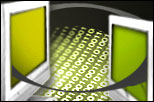Ubuntu takes early lead in open source census

Early results in a study that aims to track open source installations in business has seen Ubuntu and Firefox race to the top of the charts.
The Open Source Census Web site — a joint venture between a group of vendors, research organisations and open-source advocates — was launched yesterday in the US, and aims to "paint an accurate portrait of open source usage in the enterprise" according to the groups statement.

The Web site will allow companies and individual users to submit data anonymously on the number and volume of open source installations across their desktops and servers, the results of which will then be published for free on the site. So far, over 91 ,000 installations had been detected.
Ubuntu has surged ahead in the Linux desktop distribution stakes, with Gutsy Gibbon and Hardy Heron occupying well over half of the scanned machines housing a Linux distro between them.
Meanwhile, Mozilla's Firefox browser, which is sitting at number one of the top 20 open source packages, is present on 83 percent of machines and open source compression library Zlib on 81 percent.
Results have also pegged the US at the top of the open source tree, representing 39 percent of participants in the census so far.
Stewart Smith, president of the Australian Linux Foundation, welcomed the census. "It's been really difficult to gauge the actual numbers when it comes to free software," he said. "I think it's larger than what a lot of people are aware of".
"Anyone or any business who's downloaded Firefox or Google Talk is using free software, but the tough part is figuring out exactly how many people have these kinds of applications and others installed on their systems," Smith said.
The Linux Foundation president noted that download figures do not draw an accurate sketch of the spread of open source, giving the example that an organisation with Firefox installed across 200 desktops may only have downloaded it once.
However, Smith noted that technical staff across a large range of enterprises download open source software effectively "in secret", also making it difficult to assess the true scale of open source adoption.
"Often people higher up in the organisation just aren't aware of it, in a lot of cases the people on the ground with the tech know-how will download and install something where they need it, find it works and say nothing more of it; it's not as if they have to plead for budget," he said.
Smtih's assertions have been supported by the figures so far, with small organisations — of between one and forty nine employees — accounting for more than half of the participants.
According to Smith, the group behind the census has overcome one of the difficulties in assessing the prevalence of open source by allowing users to submit the census information anonymously, as businesses and their IT staff have in many instances been reluctant to reveal what they have installed in any great detail.
"The fact that it's anonymous is a big bonus," he said.